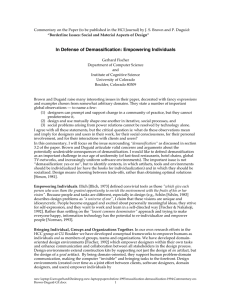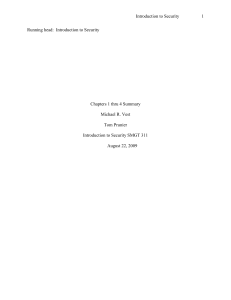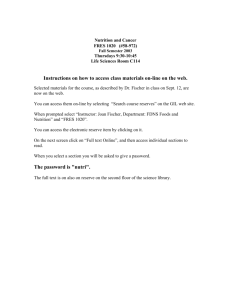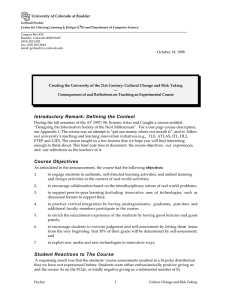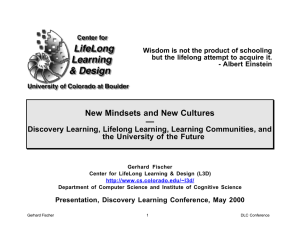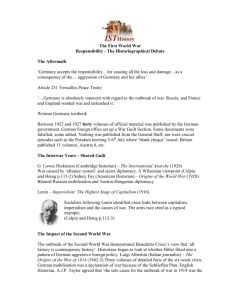Exploring Fundamental Transformations of Learning and Discovery in Cultures of Participation
advertisement
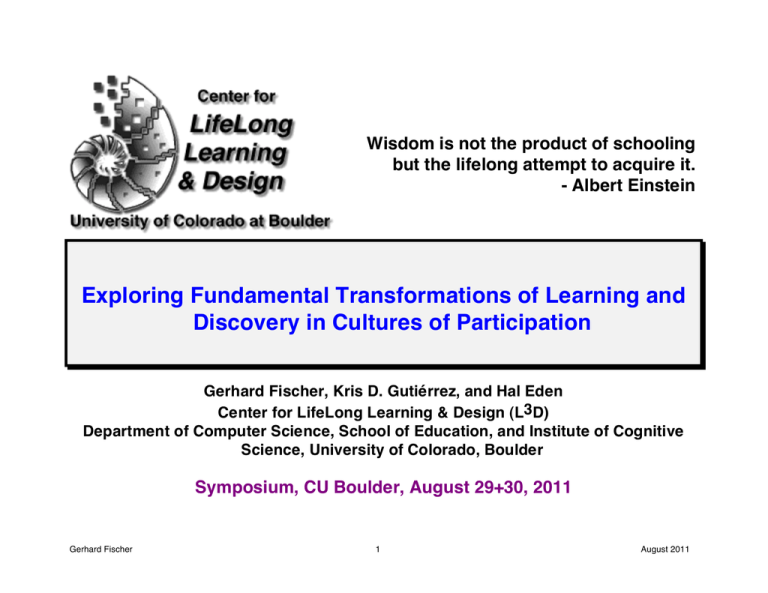
Wisdom is not the product of schooling
but the lifelong attempt to acquire it.
- Albert Einstein
Exploring Fundamental Transformations of Learning and
Discovery in Cultures of Participation
Gerhard Fischer, Kris D. Gutiérrez, and Hal Eden
Center for LifeLong Learning & Design (L3D)
Department of Computer Science, School of Education, and Institute of Cognitive
Science, University of Colorado, Boulder
Symposium, CU Boulder, August 29+30, 2011
Gerhard Fischer
1
August 2011
Overview
CDI program at NSF
Our Research Project
Fundamental Transformations of Learning and Discovery
Cultures of Participation
Themes:
- Human-Centered Computing
- Socio-Technical Environments
- Energy Sustainability, Smart Grid, Smart Meters
Gerhard Fischer
2
August 2011
The CDI Program at NSF
will support bold multidisciplinary activities that, through computational
thinking, promise radical, paradigm-changing research findings
grantees need to engage in productive intellectual partnerships involving
investigators from academe, industry and/or other types of organizations,
including international entities
CDI investigators of different disciplinary perspectives should collaborate on
the formulation, design, development, implementation, and continuous
improvement of virtual organizations to test and verify proposed theories and
models of distributed learning and discovery with specific problems,
populations and purposes
Gerhard Fischer
3
August 2011
The Overarching Research Question for our Proposal
Which fundamental transformations of learning and discovery can
be achieved by supporting and fostering cultures of participation?
theoretical frameworks (TFs)
- TF-1: creating transformative models for knowledge creation, accumulation, and
sharing Model-Authoritative and Model Democratic
- TF-2: developing meta-design as a foundation for cultures of participation
democratizing participation
- TF-3: articulating and supporting richer ecologies of participation solving
systemic problems transcending the individual human mind and requiring
collaborative actions
two specific application contexts (ACs):
- AC-1: Smart Grid environments / Energy Sustainability
- AC-2: the World-in-3D domain (collaboration with Google)
Gerhard Fischer
4
August 2011
Multidisciplinary Perspective of our CDI Grant
Gerhard Fischer
5
August 2011
Fundamental Transformations of Learning
and Discovery at a Global Level
21st century skills
lifelong learning
self-directed, passion-based learning
expansive learning
synthesis between formal and informal learning
transcending the unaided, individual human mind
learning when the answer is not known
Gerhard Fischer
6
August 2011
Science of Learning
“The inverse of school is possible: that we can depend on self-motivated
learning instead of employing teachers to bribe or compel the student to find
the time and the will to learn; that we can provide the learner with new links
to the world instead of continuing to funnel all educational programs through
the teacher.” — Ivan Illich “Deschooling Society” (1971)
“A decade of interdisciplinary research on everyday cognition demonstrates
that school-based learning, and learning in practical settings, have significant
discontinuities. We can no longer assume that what we discover about
learning in schools is sufficient for a theory of human learning.” —
Scribner and Sachs
“In important transformations of our personal lives and organizational
practices, we must learn new forms of activity which are not there yet. They
are literally learned as they are being created. There is no competent
teacher. Standard learning theories have little to offer if one wants to
understand these processes.” — Yrjö Engeström
Gerhard Fischer
7
August 2011
Formal and Informal Learning?
<source: LIFE Center, University of Washington + Stanford + SRI>
Gerhard Fischer
8
August 2011
Learning In School and Out
<< Lauren Resnick: The 1987 Presidential Address >>
School Learning
Other Learning
individual cognition
shared cognition
pure mentation (tools for learning) tool manipulation (tools for living)
symbol manipulation
contextualized reasoning
generalized learning
situation-specific competencies
questions
- have these insights caused any changes in the 24 years?
- what do we know in 2011 that we did not know in 1987?
- are we confronted with different opportunities (e.g., digital technologies) and new
challenges (e.g., outsourcing of jobs)?
Gerhard Fischer
9
August 2011
Background — Research Activities by our Invited Guests
Collins, A., & Halverson, R. (2009) “Rethinking Education in the Age of
Technology: The Digital Revolution and the School”
Rogoff, B., et al (2007). “Childrenʼs development of cultural repertoires through
participation in everyday routines and practices”
Shirley Brice Heath (2012): “Words at work and play: Three decades in family
and community life”
Derry, S. J., Schunn, C., & Gernsbacher, M. A. (Eds.) (2005) “Interdisciplinary
Collaboration: An Emerging Cognitive Science”
Gerhard Fischer
10
August 2011
Background — Selected Collaborative Efforts
Lopez, A., Correa-Chavez, M., Rogoff, B., & Gutiérrez, K. (2010). “Attention to
instruction directed to another by U.S. Mexican-heritage children of varying cultural
backgrounds. Developmental Psychology”
Gutiérrez, K. & Rogoff, B. (2003). “Cultural ways of learning: Individual traits or
repertoires of practice. Educational Researcher”
Derry, S. J., & Fischer, G. (2005) “Toward a Model and Theory for Transdisciplinary
Graduate Education” (AERA'2005)
Collins, A., Fischer, G., Barron, B., Liu, C., & Spada, H. (2009) "Long-Tail Learning:
A Unique Opportunity for CSCL?" (CSCL’2009)
Fischer, G., Derry, S., Eisenberg, M., A., R., & Collins, A. (2011) “Design Research
Exploring Transformative Frameworks for Learning and Education” (AERA’2011)
Gerhard Fischer
11
August 2011
A Small Sample of Other Research
Illich, I. (1971) “Deschooling Society”
Gee, J. P., & Hayes, E. (2009) “Public Pedagogy through Video Games: Design,
Resources & Affinity Spaces”
Mizuko Ito et al (2009): “Hanging Out, Messing Around, and Geeking Out: Kids
Living and Learning with New Media”
Henry Jenkins et al: “Confronting the Challenges of Participatory Culture: Media
Education for the 21st Century” (The John D. and Catherine T. MacArthur Foundation
Reports on Digital Media and Learning)
Engeström, Y., & Sannino, A. (2010) "Studies of Expansive Learning: Foundations,
Findings and Future Challenges”
Thomas, D., & Brown, J. S. (2011) “A New Culture of Learning: Cultivating the
Imagination for a World of Constant Change”
Gerhard Fischer
12
August 2011
L3D’s Credo of Lifelong Learning
assumption: If the world of working and living relies on collaboration,
creativity, definition and framing of problems and if it requires dealing with
uncertainty, change, and intelligence that is distributed across minds, cultures,
disciplines, and tools
consequence: then education should foster on competencies that prepare
students for having meaningful and productive lives in such a world
Gerhard Fischer
13
August 2011
What's Wrong with the Universities of Today
lecture dominated — emphasizing passive knowledge absorption instead of
active knowledge construction
curriculum dominated — little room for authentic, self-directed learning
activities
students solve given problems — they do not learn to frame problems
problems in school have right or wrong answers — problem in the real world
are wicked, ill-defined, ill-structured
closed book exams — ignoring distributed cognition
little emphasis on collaborative learning and communication skills —
working together is regarded as “cheating”
Gerhard Fischer
14
August 2011
A Long Tail Framework for Self-directed, Passion-Based Learning
<< Collins, A., Fischer, G., Barron, B., Liu, C., & Spada, H. (2009) "Long-Tail Learning: A Unique
Opportunity for CSCL?" In Proceedings of CSCL 2009 >>
Gerhard Fischer
15
August 2011
Rethinking and Reinventing Learning and Education from a
“Long-Tail” Perspective
basic beliefs / assumptions:
- individuals learn more and better when they learn in areas they choose and for
which they are motivated
- all people are interested in something (Viking Ships, Dinosaurs, gambling,
Nuremberg trials, White Rose, Castles in Northern Germany, ……)
- Whatever someone’s particular interest is, there is some niche community
already formed on the net that the person can join
a new synergy and hybrid model: integrate head and tail of the long-tail)
create richer learning environments
- head — basic knowledge and skills: learning to learn, learning on demand,
preparation for future learning, soft skills, digital fluency, ……………
- tail — personally meaningful problems: interest and passion, self-directed
learning and intrinsic motivation, local knowledge in a globalized world
Gerhard Fischer
16
August 2011
TF-1: creating transformative models for knowledge
creation, accumulation, and sharing
MODEL-AUTHORITATIVE Underlying Consumer Cultures
(“Filter-then-Publish”)
Gerhard Fischer
17
August 2011
MODEL-DEMOCRATIC Underlying Cultures of Participation
(“Publish-then-Filter”)
Gerhard Fischer
18
August 2011
TF-2: Meta-design = “Design for Active Participation”
A fundamental objective of meta-design
-
to create living socio-technical environments in which users can participate actively
as co-designers to shape those systems through collaboration in situations in which
such participation is personally meaningful
- meta-designers (e.g.: teachers, software tool designers) use their own creativity to
create context for other people (students, software users) more creative
related aspects:
- teacher, learner = f{person} f {context} — Barbara Rogoff’s “communities of
learners” (instead of adult-run or children-run education)
- affinity spaces (Gee)
Gerhard Fischer
19
August 2011
Meta-Design and the Seeding, Evolutionary Growth,
Reseeding (SER) Model
self-application to our own teaching activities:
- courses-as-seeds changed our teaching for the last decade
- information repositories (“wikis”) seeded by instructor, extended by students
Gerhard Fischer
20
August 2011
TF-3: Richer Ecologies of Participation
Gerhard Fischer
21
August 2011
Application Domain: 3D Modeling (Manhattan in 3D)
Gerhard Fischer
22
August 2011
Application Domain: Energy Sustainability
energy sustainability = a theme of national and worldwide importance
technical innovations:
-
the Smart Grid (overlaying the electrical grid with a computational information
system facilitating two-way communication)
- advanced metering infrastructures measuring, collecting, and analyzing energy
usage by interacting with smart meter devices
challenges of harvesting the benefits of technical innovations:
- most citizens are unaware of new technological developments;
- information presentation is poorly designed
- the social context of individual energy use is ignored, and few interaction and
collaboration mechanisms exist
- feedback alone is not persuasive enough to change human behavior.
claim: all of these challenges are grounded in the intersection of human
behavior (at individual and social levels) and technology
Gerhard Fischer
23
August 2011
Energy Illiteracy
How Things Are: Current Understanding and Use of Energy
<<source: Reeves, B., Robinson, T., Banerjee, B., & Sweeney, J. (2009) Large-Scale Energy
Reductions through Sensors, Feedback, & Information Technology>>
“I use energy in my home but itʼs invisible. I donʼt consume it directly but only
via things I want like light, heat and refrigeration. I rarely think about the
energy Iʼm using, and most of my use is habitual and unconscious.
The amount of energy I use is registered on a meter thatʼs out of sight,
unintelligible, and read by someone else. I only get feedback about my
energy use in the form of monthly bills that present complex data that are a
month old, and are boring and impersonal.
When information is provided to me about how and why I should change my
behavior, it is also boring and impersonal and often not even applicable to my
situation.
Even when I understand it, I rarely act.”
Gerhard Fischer
24
August 2011
Socio-Technical Environments for Energy Sustainability
Electric Grid
Gerhard Fischer
Smart Grid
Human Grid
25
August 2011
Application Domain: Energy Sustainability
Gerhard Fischer
26
August 2011
Cultures of Participation
—
Fundamental Challenge and Opportunity
consumer cultures
focus: produce finished goods to be consumed passively
⇓
cultures of participation
focus: provide all people are with the means to participate actively in
personally meaningful problems
emphasis: the participatory web (“Web 2.0”) is not a technological but a social
revolution
Gerhard Fischer
27
August 2011
Cultures of Participation Addressing Important Societal Problems
problems of a magnitude which individuals and even large teams cannot solve
(example: to model all buildings in the world in 3D as addressed by “Goggle
SketchUp and 3D Warehouse”)
problems of a systemic nature requiring the collaboration of many different
minds from a variety of background (example: cultures of participation)
problems being poorly understood and ill-defined and therefore requiring the
involvement of the owners of problems because they cannot be delegated to
others (example: digital literacy to become independent of high-tech scribes)
problems modeling changing and unique worlds being dependent on open,
living information repositories and tools (example: meta-design, SER model)
Gerhard Fischer
28
August 2011
Environments Created by Cultures of Participation
Site
Wikipedia
KNOL
iTunes U
YouTube
Objectives and Unique Aspects
web-based collaborative multilingual encyclopedia with a single,
collaborative, and verifiable article; authority is distributed
(http://www.wikipedia.org/)
a library of articles by recognized experts in specific domains; authors
take credit and elicit peer reviews; readers can provide feedback and
comments; authority rests primarily with the author
(http://knol.google.com/)
courses by faculty members from “certified institutions”; control via input
filters; material can not be remixed and altered by consumers
(http://www.apple.com/education/itunes-u/)
video sharing website with weak input filters and extensive support for
rating (http://www.youtube.com/)
Encyclopedia of documentation of the 1.8 million known living species; development of an
Life (EoL)
extensive curator network; partnership between the scientific
community and the general public (http://www.eol.org/)
SketchUp and repository of 3D models created by volunteers organized in collections by
3D
curators and used in Google Earth
Warehouse
(http://sketchup.google.com/3dwarehouse/)
Gerhard Fischer
29
August 2011
Environments Created by Cultures of Participation
Scratch
Learning environment for creating, remixing, and sharing programs to build
creative communities in education (http://scratch.mit.edu)
Instructables
socio-technical environment focused on user-created and shared do-ityourself projects involving others users as raters and critics
(http://www.instructables.com/)
PatientsLikeMe collection of real-world experiences enabling patients who suffer from lifechanging diseases to connect and converse
(http://www.patientslikeme.com/)
Ushahidi
tools for democratizing information, increasing transparency and lowering
the barriers for individuals to share their stories; originated in the
collaboration of Kenyan citizen journalists during crises
(http://www.ushahidi.com/)
Stepgreen
Gerhard Fischer
library of energy saving actions, tips, and recommendations by citizen
contributors for saving money and being environmentally responsible
(http://www.stepgreen.org/)
30
August 2011
Consumer and Designers — Beyond Binary Choices
claims:
- there is nothing wrong about being a consumer (watching a tennis match, listening
to a concert, ...)
- the same person wants to be a consumer in some situations and in others a
designer consumer / designer is not an attribute of a person, but of a context
consumer / designer ≠ f{person} f{context}
problems:
- someone wants to be a designer but is forced to be a consumer personally
meaningful activities
- someone wants to be a consumer but is forced to be a designer personally
irrelevant activities
Gerhard Fischer
31
August 2011
Design Trade-Offs for Cultures of Participation
advantages of cultures of participation
-
extensive coverage of information
creation of large numbers of artifacts
creative chaos by making all voices heard
reduced authority of expert opinions
disadvantages
-
participation overload
accumulation of irrelevant information
lack of coherent voices
fragmented culture based on too many idiosyncratic voices (a modern version of the
“Tower of Babel”)
Gerhard Fischer
32
August 2011
Drawbacks of Cultures of Participation:
Engaging People in Personally Irrelevant Activities
we have all become
-
telephone operators and travel agents
check-in clerks (at airports) and check-out clerks (in supermarkets)
file expense reports and typeset our papers
<<……many more things ………….>
drawbacks:
- we (e.g., as faculty members) are paid more money per hour than staff members
being experts in these activities
- we are not particularly skillful doing these activities (doing them only very rarely)
questions:
- who are the winners (e.g.: companies off-loading work to us)?
- are these additional burdens only felt by the “non-digital natives”)?
- are our systems supporting us in these activities still too inefficient?
Gerhard Fischer
33
August 2011
New Discourses: Motivation, Control, Ownership, Quality,
and Changing Human Behavior
Motivation: material gain + psychological well-being, social integration and
connectedness, social capital, recognition, reputation, gift cultures
Control: cultures of participation erode monopoly positions held by professions,
educational institutions, experts, and high-tech scribes
Ownership: cultures of participation are less successful
- when users are brought into the process late (thereby denying them ownership)
- when they are “misused” to fix problems and to address weaknesses of systems
that the developers did not fix themselves
Gerhard Fischer
34
August 2011
New Discourses — Continued
Quality — Example: Encyclopedia Britannica Wikipedia
- errors will always exist, resulting in learners acquiring the important skill of being
critical of information rather than blindly believing in what others (specifically experts
or teachers) are saying
- ownership as a critical dimension: the community at large has a greater sense of
ownership and thereby is more willing to put an effort into fixing errors
- importance of public scrutiny (data on how quickly information is corrected in
Wikipedia)
- claim: there are only limited ways to filter for quality in advance — which are
sometimes counter-productive
changing human behavior
- technology alone does not determine social structure nor does it change human
behavior: it creates feasibility spaces for new social practices and it can persuade
and motivate changes at the individual, group, and community level.
- human-centered technologies can change people's lives (1) by making it easier for
people to do things, and (2) by providing value that cannot be accounted for in
monetary terms
Gerhard Fischer
35
August 2011
Some Claims about (Intrinsic) Motivation and Interests
the chief impediments to learning are not cognitive but motivational
people can learn many things if they want to
motivation is a tricky problem in learning because while it plays a major role, it
is not well understood
examples:
- “A Fine is a Price” Story Coming Late to the Child Care Center;
http://rady.ucsd.edu/faculty/directory/gneezy/docs/fine.pdf
-
Gerhard Fischer
the Piano Stairs; http://www.youtube.com/watch?v=2lXh2n0aPyw&feature=player_embedded#
36
August 2011
Assessment
conventional assessment techniques are of little value
- standardized tests
- curricular coverage
aspects that can be “easily” measured
-
how people located a site, how often they visit it, how many contributions they have
made (using tools such as Google Analytics)
- how well a site lives up to certain usability and sociability factors
aspects difficult to assess and measure:
- intrinsic motivation underlying self-directed and collaborative learning
- which guidance, scaffolding, critiquing, feedback is effective?
- change in (persistent) human behavior
an interesting suggestion (by Allan Collins): national credentials
demonstrating expertise in a set of skills
Gerhard Fischer
37
August 2011
Community Building of our CDI Grant
in response to CDI objective: establish productive intellectual partnerships
companies:
- Tendril — “Helping energy service providers and their customers solve energy
challenges together”
- Google, Boulder — OpenStudio Plug-in for Google SketchUp
Research Labs:
- National Renewable Energy Laboratory (NREL; Golden) — OpenEI (= Open Energy
Information Repository)
- Renewable and Sustainable Energy Institute (RASEI), CU Boulder — empirical
studies Karen Ehrhardt-Martin et al (2010:) “Advanced Metering Initiatives and
Residential Feedback Programs: A Meta-Review for Household Electricity-Saving
Opportunities”
learning communities
- schools: After-School Program “El Pueblo Magico” (Kris Gutiérrez)
- universities: sustainability action team and environmental board of CU Boulder
- international: Fraunhofer Institute, Bonn, Germany
Gerhard Fischer
38
August 2011
Co-Evolution: Beyond “Technology-Driven Developments”
and “Gift-Wrapping”
learning, working
and
collaboration
new learning
organizations
new media and
new technologies
Gerhard Fischer
39
August 2011
Summary Statements and Objectives
the major objectives of the Center for Lifelong Learning & Design (L3D):
- lifelong learning: “Doing basic research on real problems”
- design: “Philosophers interpret the world in various ways; what matters is to
change it!” (Karl Marx)
my own personal life objective: “envision and create socio-technical
environments in which people want to learn rather than have to learn”
- an early reflection on this objective: Burton, R. R., Brown, J. S., & Fischer, G.
(1984) "Analysis of Skiing as a Success Model of Instruction: Manipulating the
Learning Environment to Enhance Skill Acquisition." In B. Rogoff, & J. Lave (Eds.),
Everyday Cognition: Its Development in Social Context
- analogy: “Exxon sells a product which people need — Apple sells a product which
people want”
objectives for the symposium:
- explore “symmetry of ignorance”
- exploit productive controversies
Gerhard Fischer
40
August 2011
